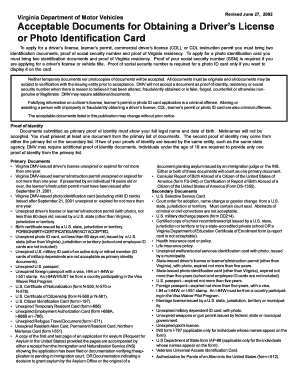5 Must-Have Documents for Your DMV Visit

Visiting the Department of Motor Vehicles (DMV) can often be an intimidating experience, filled with long lines, complex paperwork, and a myriad of requirements that can be confusing if you're not prepared. To make your visit smoother and more productive, knowing which documents you need to bring is key. This article dives into the 5 Must-Have Documents for Your DMV Visit, ensuring you're equipped to tackle any transaction with ease.
1. Proof of Identity

To begin with, you'll need to establish your identity. This is crucial for tasks like getting or renewing a driver's license, ID card, or when applying for vehicle registration. Acceptable forms of identification include:
- Passport - Valid for all citizens
- Driver's License or ID Card from another state
- Birth Certificate - Original or certified copy

🔍 Note: A Social Security card by itself is generally not accepted as proof of identity; you'll need something with a photo.
2. Proof of Residency

Proving your current residence in the state is just as important. Here's a list of documents commonly accepted as proof of residency:
- Utility bills in your name (e.g., gas, electricity, water)
- Rental or mortgage agreement
- Voter registration card
| Document | Details |
|---|---|
| Utility Bill | Must show your name and current address |
| Rental Agreement | Signed by both you and the property owner |
| Voter Registration | Shows your name and current address |


📌 Note: Some DMVs might require more than one form of proof, so check local requirements to avoid delays.
3. Social Security Number (SSN)

The Social Security Number is necessary for various DMV transactions. Although a Social Security card itself is not accepted as a standalone identity proof, you'll need to provide your SSN. You can do so with:
- W-2 form or pay stub
- SSA-1099 or 1042-S
- Social Security card
💡 Note: If you're concerned about identity theft, consider covering all but the last four digits on any documents provided for your SSN.
4. Vehicle Information

If you're dealing with vehicle-related transactions such as registration or title transfers, you'll need:
- The Vehicle Identification Number (VIN)
- Current registration documents or title

5. Insurance Proof

In many states, proof of auto insurance is mandatory when registering your vehicle or during any official transaction at the DMV:
- Insurance ID card or certificate
- Policy declaration page
⚠️ Note: Some DMVs require insurance to be in effect before they can process your transaction, so ensure your coverage starts immediately if you're acquiring a new vehicle.
In summary, understanding the necessary paperwork for your DMV visit can significantly reduce stress and the time spent waiting in line. By preparing your proof of identity, residency, SSN, vehicle information, and insurance ahead of time, you'll streamline your visit, ensuring everything goes as smoothly as possible. Remember, it's always good to check the specific requirements for your state, as regulations can differ, and any changes in your personal status might influence the documents you need.
Why do I need to provide proof of residency?

+
The DMV needs to confirm that you live in the state where you’re registering your vehicle or applying for a license to ensure compliance with local laws and regulations.
Can I use a bank statement as proof of identity?

+
Generally, no. Bank statements do not contain a photo and are not accepted as primary proof of identity. They can serve as secondary proof of residency, however.
What if I’ve recently moved and don’t have utility bills?

+
If you’re new to an area, a lease or rental agreement, or a letter from your employer with your new address can suffice as proof of residency.
Do I need a physical Social Security card?

+
While having the card is helpful, you can also provide other documents that list your SSN, like W-2 forms or payroll stubs.



